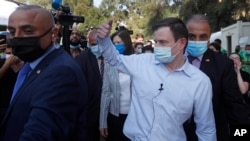U.S. senior diplomat David Hale said in Beirut Thursday the U.S. Federal Bureau of Investigation will join Lebanese and international investigators in a probe into the recent explosion in Lebanon’s capital city that killed scores of people and injured thousands of others.
During a visit to one of Beirut’s neighborhoods that was heavily damaged by the blast, the U.S. undersecretary for political affairs said the FBI would join the investigation at the invitation of Lebanese authorities.
Hale said the FBI’s participation in the probe is one way the U.S. is helping the country cope with the aftermath of the massive explosion.
Hale is scheduled to meet with Lebanese officials over the next two days. The U.S. Embassy said Hale was to emphasize the need for reform when he meets with officials.
Earlier Thursday, Lebanese Parliament Speaker Nabih Berri called for the speedy formation of a new government as lawmakers approved the government’s two-week state of emergency after the recent devastating explosion that killed scores of people and injured thousands of others.
Lebanese state media said Berri urged lawmakers at parliament’s first legislative session since the August 4 blast to begin “speeding up the formation of a (new) government.”
Lawmakers have begun consultations on forming a new cabinet, a process complicated by divisions in a country governed by a sectarian power-sharing system.
Parliament approved the state of emergency to suppress resurgent protests over corruption, mismanagement and negligence by the long-entrenched political elite.
Hundreds of people have been injured in clashes with security forces who fired tear gas.
Prime Minister Hassan Diab announced his government’s resignation Monday night in the aftermath of the blast. The resignations were confirmed at Thursday’s legislative session.
The Lebanese government took office in January with support from Iran-backed Shi’ite Muslim Hezbollah and other parties. Hezbollah, which the U.S. considers a terrorist organization, and its allies have a majority of seats in parliament.
According to the U.S. Embassy, Hale “will underscore America’s willingness to support any government that reflects the will of the people and is genuinely committed to and acting upon such a reform agenda.”
The massive blast, which killed 172 people, injured about 6,000 others and left about 300,000 homeless, is blamed on the detonation of 2,750 tons of ammonium nitrate that had been improperly stored for six years at the Port of Beirut.
Rebuilding is expected to cost billions of dollars. Economists have forecast the damage could erase up to 25% of the country's economic output.
Humanitarian aid is being provided to Lebanon, but foreign countries have made clear they will not provide funds to help the country avoid economic collapse without reform.







